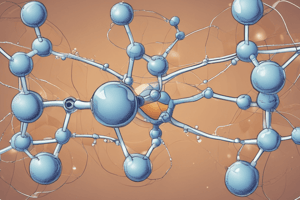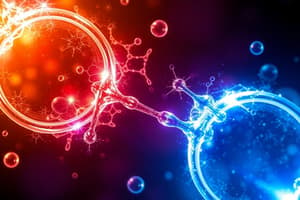Podcast
Questions and Answers
Why does the formation of a triple bond in a nitrogen molecule require both atoms to share six electrons?
Why does the formation of a triple bond in a nitrogen molecule require both atoms to share six electrons?
- To decrease the bond length.
- To achieve a stable noble gas electron configuration. (correct)
- To achieve a stable octet electron configuration.
- To increase the bond strength.
What determines the bond strength of a bond?
What determines the bond strength of a bond?
- The electronegativity of the atoms.
- The number of shared electrons. (correct)
- The bond length.
- The number of participating atoms.
How is a triple bond represented in chemical notation?
How is a triple bond represented in chemical notation?
- With three parallel lines. (correct)
- With three dots between the atoms.
- With a single line.
- With two parallel lines.
Why is the energy required to break a triple bond higher than that for a double or single bond?
Why is the energy required to break a triple bond higher than that for a double or single bond?
How is the distance between nuclei of two atoms related to the type of bond formed?
How is the distance between nuclei of two atoms related to the type of bond formed?
In ionic bonding, the transfer of valence electrons primarily occurs between which types of elements?
In ionic bonding, the transfer of valence electrons primarily occurs between which types of elements?
What type of compounds are usually crystalline solids and have high melting and boiling points?
What type of compounds are usually crystalline solids and have high melting and boiling points?
How do covalent bonds differ from ionic bonds?
How do covalent bonds differ from ionic bonds?
Which type of bond is formed when two atoms share two electrons each to acquire their nearest noble gas configuration?
Which type of bond is formed when two atoms share two electrons each to acquire their nearest noble gas configuration?
What do Lewis dot structures represent?
What do Lewis dot structures represent?
Flashcards are hidden until you start studying




